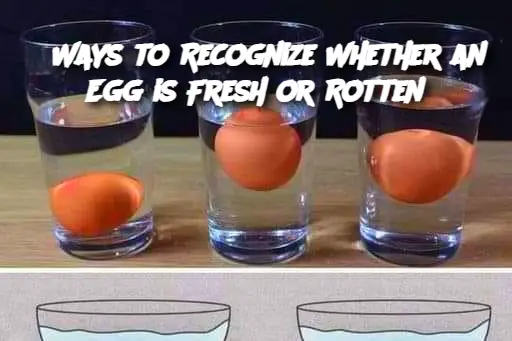ADVERTISEMENT
Introduction
Eggs are a staple in many households, used in countless recipes from breakfast dishes to baked goods. However, over time, eggs can lose their freshness, and consuming a rotten egg can lead to foodborne illnesses. Knowing how to determine whether an egg is still good to eat is essential for both safety and taste. In this article, we’ll walk you through five simple methods to easily check if your eggs are fresh or if it’s time to toss them.
Ingredients:
Fresh eggs (or eggs you want to check for freshness)
Directions:
Here are five foolproof ways to determine whether an egg is fresh or rotten:
The Water Test (Float Test):
Fill a bowl with cold water and gently place your egg in it.
Fresh eggs will sink and lay flat at the bottom.
Slightly older eggs may stand upright or tilt slightly but will still stay at the bottom.
Rotten eggs will float to the top. This occurs because over time, air enters the egg and causes the egg to become buoyant. Floating eggs are unsafe to eat and should be discarded.
The Sniff Test:
Crack the egg open on a clean plate or bowl.
Fresh eggs will have a neutral, almost no smell.
Rotten eggs emit a strong, sulfuric, or unpleasant odor. This is the result of bacteria breaking down the egg’s contents, and a foul smell is a definite indication that the egg should be discarded.
The Visual Test:
Examine the egg shell.
Fresh eggs should have smooth, uncracked shells.
Rotten eggs may show signs of mold or cracks, which indicate that bacteria could have entered the egg, spoiling it.
The Shake Test:
Gently shake the egg close to your ear.
Fresh eggs will not make a sound. The contents are firm and held in place by the membrane.
Old eggs might make a sloshing sound as the liquid inside has thinned and air has accumulated, indicating that the egg is no longer fresh.
The Yolk and White Test:
Crack the egg onto a flat surface.
Fresh eggs will have a round, firm yolk, and the egg white will stay compact around it.
Older eggs will have a flatter yolk and a more runny white that spreads more easily. This is because the egg’s proteins weaken over time.
Serving and Storage Tips:
Storing eggs: To prolong the shelf life of eggs, store them in their original carton in the coldest part of the refrigerator, not in the door where the temperature fluctuates. This helps maintain their freshness for longer.
Using eggs: When using eggs in recipes, if you’re unsure of their freshness, use the water test first. Fresh eggs work best for dishes like poached eggs or soft-boiled eggs, where the integrity of the egg is key.
Expiration date: Always check the "sell by" or "use by" dates on the carton, but remember that eggs can last a little beyond this date if stored properly.
Variations:
ADVERTISEMENT
